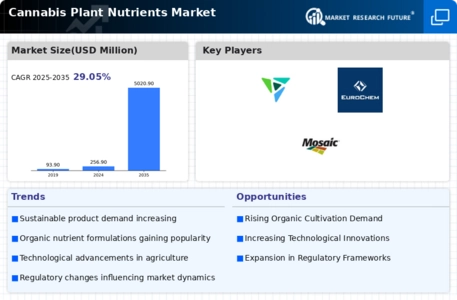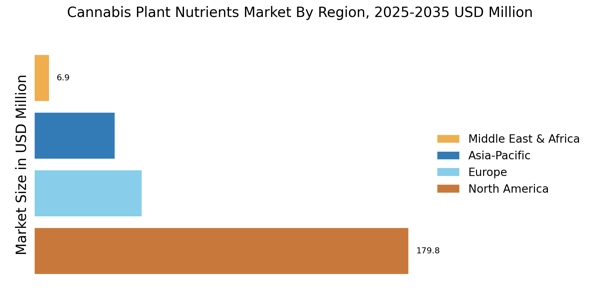Increasing Legalization of Cannabis
The ongoing trend of legalization across various regions appears to be a primary driver for the cannabis plant nutrients Market. As more countries and states embrace cannabis for both medicinal and recreational use, the demand for high-quality plant nutrients is likely to surge. This shift not only encourages new growers to enter the market but also compels existing cultivators to enhance their production quality. According to recent data, the number of legal cannabis markets has expanded significantly, with projections indicating a potential market size of over 70 billion dollars by 2028. This burgeoning market creates a fertile ground for nutrient suppliers, who must adapt their offerings to meet the diverse needs of a growing customer base.
Rising Consumer Awareness of Quality
Consumer awareness regarding the quality of cannabis products is on the rise, which significantly impacts the Cannabis Plant Nutrients Market. As consumers become more educated about the benefits of organic and high-quality nutrients, they are increasingly demanding products that enhance the growth and potency of cannabis plants. This trend is reflected in the growing preference for nutrient solutions that are free from harmful chemicals and additives. Market data suggests that organic nutrient sales have seen a substantial increase, with a notable percentage of growers opting for organic solutions to meet consumer expectations. This shift not only influences purchasing decisions but also drives manufacturers to innovate and improve their product lines to cater to this discerning market.
Sustainability Trends in Agriculture
The increasing emphasis on sustainability within the agricultural sector is significantly influencing the Cannabis Plant Nutrients Market. Growers are increasingly seeking eco-friendly nutrient solutions that align with sustainable farming practices. This trend is driven by both consumer demand for environmentally responsible products and regulatory pressures aimed at reducing the ecological footprint of agriculture. Market data indicates a growing segment of the industry focused on biodegradable and organic nutrients, which are perceived as more sustainable alternatives. As sustainability becomes a core value for many consumers, nutrient manufacturers are likely to innovate and develop products that not only meet performance standards but also adhere to environmental considerations.
Technological Innovations in Agriculture
Technological advancements in agricultural practices are playing a crucial role in shaping the Cannabis Plant Nutrients Market. Innovations such as precision agriculture, automated nutrient delivery systems, and data analytics are enabling growers to optimize their nutrient application processes. These technologies not only enhance efficiency but also improve crop yields and quality. For instance, the integration of IoT devices allows for real-time monitoring of nutrient levels, ensuring that plants receive the right amount at the right time. As these technologies become more accessible, they are likely to attract a broader range of cultivators, from small-scale growers to large commercial operations, thereby expanding the market for specialized cannabis nutrients.
Expansion of Indoor and Hydroponic Cultivation
The rise of indoor and hydroponic cultivation methods is emerging as a significant driver for the Cannabis Plant Nutrients Market. These cultivation techniques allow for year-round production and greater control over growing conditions, which in turn increases the demand for specialized nutrients tailored to these environments. As urban farming and home cultivation gain popularity, the market for nutrient solutions designed for hydroponics and indoor setups is likely to expand. Data suggests that the hydroponics market alone is projected to reach several billion dollars in the coming years, indicating a robust opportunity for nutrient suppliers to cater to this niche yet growing segment of cannabis cultivation.

















